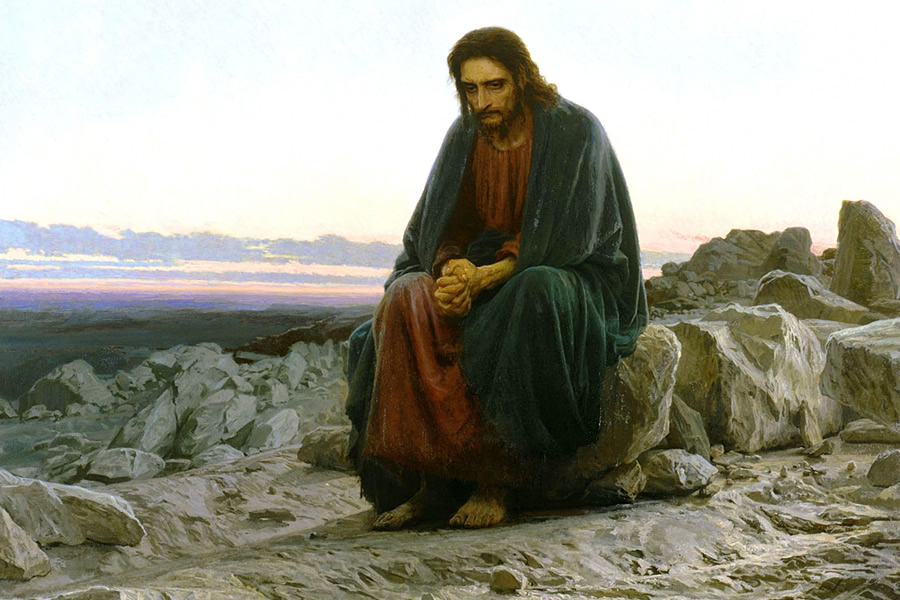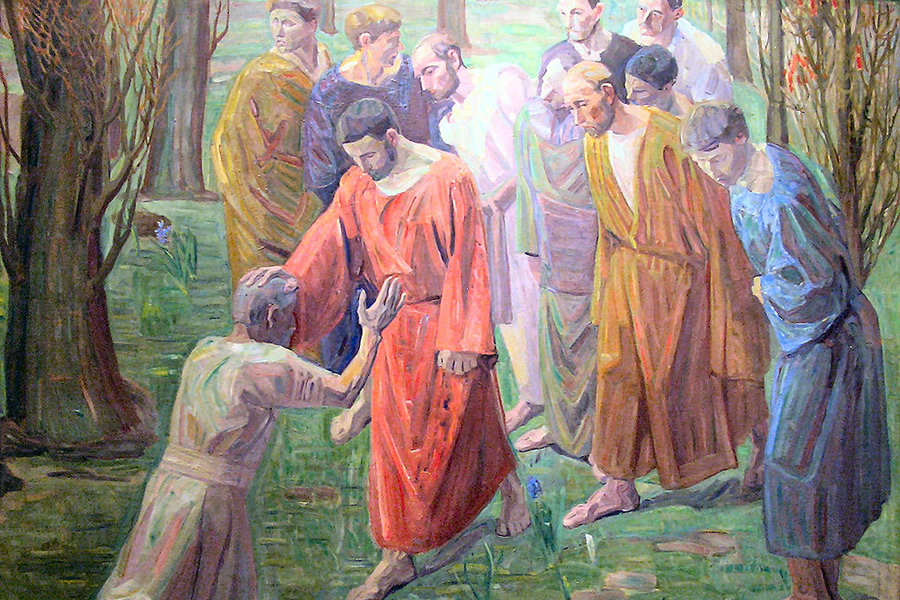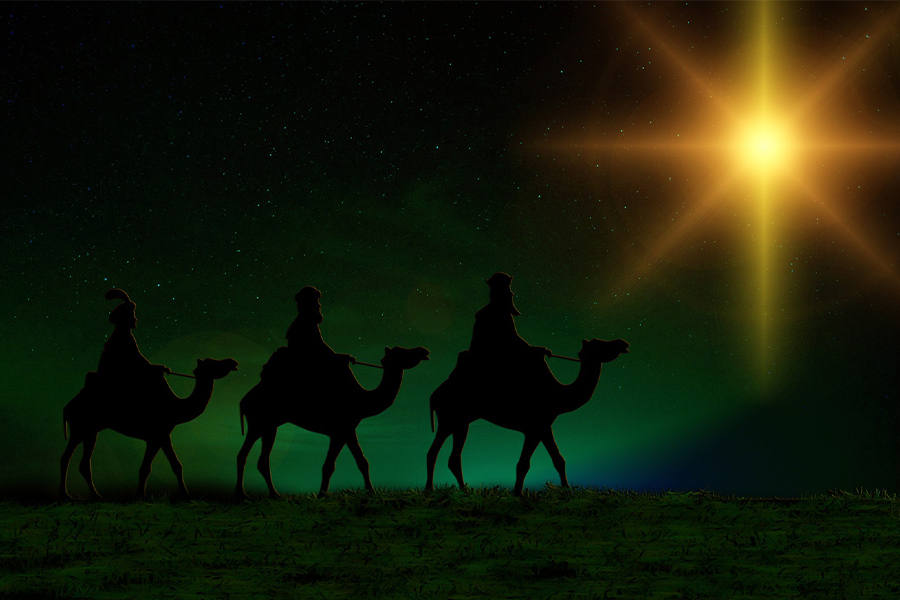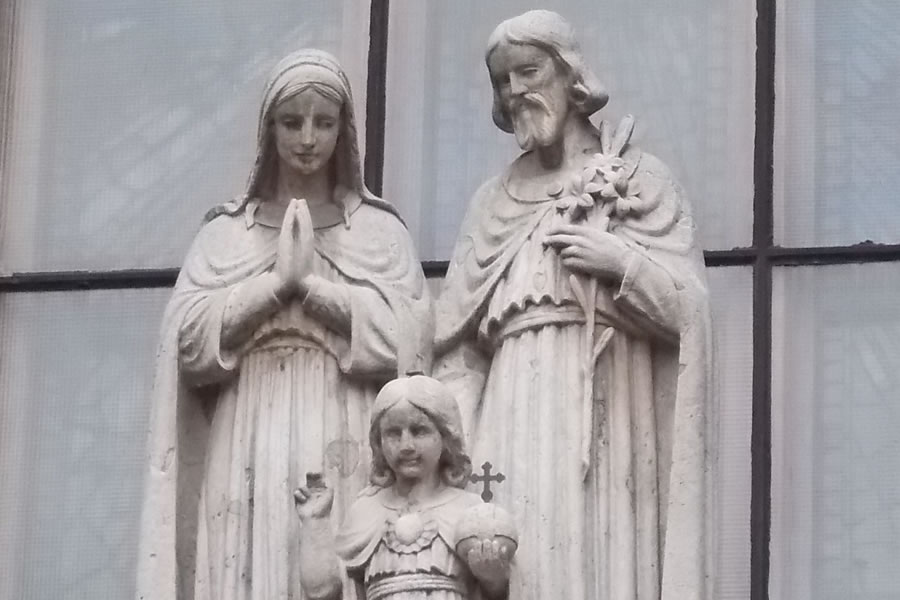St. Francis of Assisi Weekly Reflections

A Life Transfigured
02-25-2024Weekly ReflectionWe Celebrate Worship Resource, Vol. 49, No. 1Today’s first reading is difficult, to say the least. What God asks Abraham to do is horrible and outrageous, as well as illogical, considering that the covenant promised him and his descendants a great nation. It puts his faith to the test. He must have recalled that it was only by God's intervention that Sarah bore Isaac in the first place. Now Abraham is asked to trust God once again as he and his son climb the mountain. Centuries later Jesus climbs a different mountain with three of his closest disciples. When they see him transfigured and joined by Elijah and Moses, they are shocked as well, and in fact terrified. They are still confused when Jesus tells them of rising from the dead. But now we know and now we realize God’s promise to us all along. God promises us a life transfigured. God’s devotion to us, God’s faith in us, is so strong that, as Paul wrote, God handed the Son over for us all, to win our salvation. Much as Abraham did not understand God’s command, much as the disciples could not imagine what Jesus told them, we cannot fathom the infinite extent of God’s mercy and generosity.
When have you placed your trust in God without understanding how it could work out?
Una Vida Transfigurada
La primera lectura de hoy es difícil. Lo que Dios le pide a Abrahán que haga es horrible e indignante, además de ilógico, considerando que en el pacto le prometía a él y a sus descendientes una gran nación. Pone a prueba su fe. Debió haber recordado que fue sólo por la intervención de Dios que Sara dio a luz a Isaac en primer lugar. Ahora se le pide a Abraham que confíe en Dios una vez más mientras él y su hijo suben a la montaña. Siglos después, Jesús sube a una montaña diferente con tres de sus discípulos más cercanos. Cuando lo ven transfigurado y acompañado por Elías y Moisés, también se sorprenden y, de hecho, se aterrorizan. Todavía están confundidos cuando Jesús les habla de resucitar de entre los muertos. Pero ahora sabemos y se cumplió la promesa que Dios nos hizo desde el principio. Dios nos promete una vida transfigurada. La devoción de Dios hacia nosotros, la fe de Dios en nosotros, es tan fuerte que, como escribió Pablo, Dios entregó a su Hijo a todos nosotros, para ganar nuestra salvación. Por mucho que Abraham no entendiera el mandato de Dios, por mucho que los discípulos no pudieran imaginar lo que Jesús les dijo, no podemos comprender el alcance infinito de la misericordia y generosidad de Dios.
¿Cuándo has puesto tu confianza en Dios sin entender cómo podría resultar?

Temptations
02-18-2024Weekly ReflectionWe Celebrate Worship Resource, Vol. 49, No. 1“This is the time of fulfillment. The kingdom of God is as hand. Repent, and believe in the gospel” (Mark 1:15). Sounds quite urgent, and it is—for us now as for them then. But when Jesus was baptized, the Holy Spirit came down and immediately led him into the desert for forty days. How urgent could this news have been if its proclamation was delayed by a month and a half? There must have been a very important reason that the Spirit led Jesus into the desert and kept him there so long. The first reading may hold a clue. Recall that Noah, his family, and the many animals on the ark spent forty days in isolation during the flood before they were able to disembark and repopulate the earth. Before the covenant was fulfilled, a time of preparation and purification was necessary. So it is us today. This forty-day season that precedes Easter is a time for us to prepare and to purify ourselves, to “appeal to God for a clear conscience” (1 Peter 3:21). May we take this opportunity to allow the Spirit to guide us away from the temptations that prevent us from realizing the kingdom of God in our midst.
What temptation do you struggle with the most? How will you resist it this Lent so that you can better use your time and energy to live out the gospel?
Tentaciones
“Se ha cumplido el tiempo y el Reino de Dios esta cerca. Arrepiéntanse y crean en el evangelio” (Marcos 1:15). Suena bastante urgente, y lo es, tanto para nosotros ahora como para ellos entonces. Pero cuando Jesús fue bautizado, el Espíritu Santo descendió e inmediatamente lo llevó al desierto por cuarenta días. ¿Qué tan urgente pudo haber sido esta noticia si la proclamación se retraso un mes y medio? Debe haber habido una razón muy importante por la que el Espíritu llevó a Jesús al desierto y lo mantuvo allí por tanto tiempo. La primera lectura puede contener una pista. Recuerde que Noé, su familia y los muchos animales en el arca pasaron cuarenta días aislados durante el diluvio antes de poder desembarcar y repoblar la tierra. Antes de que se cumpliera la alianza, fue necesario un tiempo de preparación y purificación. Así somos nosotros hoy. Este tiempo de cuarenta días que precede a la Pascua es un tiempo para que nos preparemos y nos purifiquemos, para “rogar a Dios una conciencia limpia” (1 Pedro 3:21). Aprovechemos esta oportunidad para permitir que el Espíritu nos guíe lejos de las tentaciones que nos impiden realizar el reino de Dios entre nosotros.
¿Con qué tentación luchas más? ¿Cómo resistirás esta Cuaresma para poder usar mejor tu tiempo y energía para vivir el evangelio?

Imitate Christ
02-11-2024Weekly ReflectionWe Celebrate Worship Resource, Vol. 49, No. 1Two thousand or more years ago, expulsion from the community was the most serious consequence of leprosy. This affliction—not the same as what is now known as Hansen’s disease— was seen as a punishment from God, a clear and visible sign of impurity. Impurity was thought to be contagious. Like someone quarantined with Covid-19, the person with leprosy had to dwell apart and avoid contact with anyone else. The leper who comes to Jesus shows a lot of courage just by approaching him, but he had heard of Jesus’ healings, so he felt he needed to. But what Jesus does for him begins even before he heals him. He reaches out and touches him, making himself impure in their eyes. In order to heal him, Jesus effectively becomes a leper himself. Later, on the cross, Jesus became a leper for us all. We all have afflictions that separate us from purity, from God, from our neighbor. Not only can God heal us of those impurities, God’s Son embraces us in our impurity, stretching out his hands to us to free us from whatever keeps us apart.
Paul call us to be imitators of him, as he is of Christ. How can your imitate Christ in reaching out to someone whom society regards as impure?
Imitita A Cristo
Hace dos mil años o más, la expulsión de la comunidad era la consecuencia más grave de la lepra. Esta aflicción—distinta de lo que ahora se conoce como enfermedad de Hansen—era vista como un castigo de Dios, una señal clara y visible de impureza. Se pensaba que la impureza era contagiosa. Como alguien en cuarentena con Covid-19, la persona con lepra tenía que vivir separada y evitar el contacto con cualquier otra persona. El leproso que viene a Jesús muestra mucho coraje con solo acercarse a él, pero había oído hablar de las curaciones de Jesús, así que sintió que necesitaba hacerlo. Pero lo que Jesús hace por él comienza incluso antes de curarlo. Él extiende la mano y lo toca, volviéndose impuro a sus ojos. Para curarlo, Jesús efectivamente se convierte él mismo en leproso. Más tarde, en la cruz, Jesús se hizo leproso por todos nosotros. Todos tenemos aflicciones que nos separan de la pureza, de Dios, del prójimo. Dios no solo puede sanarnos de esas impurezas, sino que el Hijo de Dios nos abraza en nuestra impureza y nos extiende sus manos para liberarnos de todo lo que nos mantiene separados.
Pablo nos llama a ser imitadores de él, como él lo es de Cristo. ¿Cómo puedes imitar a Cristo al acercarte a alguien a quien la sociedad considera impuro?

“For This Purpose Have I Come”
02-04-2024Weekly ReflectionWe Celebrate Worship Resource, Vol. 49, No. 1It’s wonderful to imagine what it must have been like in Capernaum that special evening when Jesus stayed at Simon’s mother-in-law’s, witnessing the entire town gathered at her door marveling at him as he cured the ill and drove out demons. Imagine his disciples’ surprise when they woke up the next morning to find him missing. Perhaps after dealing with so many people who were suffering, he needed time alone. But he was not alone. He was with his Father, in prayer, who may have reminded him of his mission: proclaim repentance and the gospel and bear witness to the kingdom of God. “For this purpose have I come,” he tells his disciples (Mark 1:38). For this purpose he called them. . . and calls us. To prepare us for the kingdom, sin and evil had to be driven out. We can repent of sin and try to sin no more, but evil—as with physical or mental illness—was beyond a person’s will. Jesus stepped in to cast out that evil, be it disease, addiction, despair, or something systemic that we feel powerless to destroy. May we carry on that mission, working with God’s help to overcome the evil in the world so that God’s kingdom may be made manifest.
How do you carry on Jesus’ mission today? What can you do to help drive out the demons that afflict us?
“Para Eso He Venido”
Es maravilloso imaginar cómo debe haber sido en Cafarnaúm esa noche especial cuando Jesús se quedó en casa de la suegra de Simón, viendo a todo el pueblo reunido en su puerta maravillándose de él mientras sanaba a los enfermos y expulsaba a los demonios. Imagínese la sorpresa de sus discípulos cuando se despertaron a la mañana siguiente y descubrieron que había desaparecido. Quizás después de tratar con tanta gente que sufría, necesitaba tiempo a solas. Pero el no estaba solo. Estaba con su Padre, en oración, quien tal vez le recordó su misión: proclamar el arrepentimiento y el evangelio y dar testimonio del reino de Dios. “Para eso he venido”, les dice a sus discípulos (Marcos 1:38). Por este propósito los llamó. . . y nos llama. Para prepararnos para el reino, era necesario expulsar el pecado, pero el mal—como con la enfermedad física o mental—estaba más allá de la voluntad de una persona. Jesús intervino para expulsar ese mal, ya sea enfermedad, adicción, desesperación o algo sistémico que nos sentimos impotentes para destruir. Que podamos llevar a cabo esa misión, trabajando con la ayuda de Dios para vencer el mal en el mundo para que el reino de Dios se manifieste.
¿Cómo llevas a cabo la misión de Jesús hoy? ¿Qué puedes hacer para ayudar a expulsar los demonios que nos afligen?

How Do You Bring The Healing Power Of God To Others?
01-28-2024Weekly ReflectionWe Celebrate Worship Resource, Vol. 49, No. 1Mark wastes no time in his Gospel getting to what Jesus said and did. From the beginning of his ministry Jesus “talked the talk” and “walked the walk”, both proclaiming and demonstrating God’s power. Today Mark tells us that when Jesus taught in the synagogue he astonished the congregation because he spoke with such authority. After all, he spoke as God’s Son. Then before he left, he responded to a man with an unclean spirit by driving out the demon that possessed him, amazing the people all the more. They likely recalled that Moses had said that God would raise a prophet, a Messiah, from among their kin. Surely this was him. So they told their families, their friends, and their neighbors, and before long “his fame spread everywhere throughout the whole region of Galilee” (Mark 1:28). Perhaps some of them also recalled Jesus’ first words when he came to Galilee: “This is the time of fulfillment. The kingdom of God is at hand” (1:15). Of course Jesus was able to fulfill both the talk and the walk, for in him the kingdom was at hand. Since Jesus promised that he would be with us always, let us accept the challenge to talk the talk and walk the walk as well.
How do you exercise the power you have to bring the Lord’s care and healing to others?
¿Como Le Llevas El Poder Sanador De Dios A Los Demás?
Marcos no pierde tiempo en su Evangelio llegando a lo que Jesús dijo e hizo. Desde el comienzo de su ministerio, Jesús “habló lo que hablaba” y “caminó el camino”, proclamando y demostrando el poder de Dios. Hoy Marcos nos dice que cuando Jesús enseñó en la sinagoga asombró a la congregación porque hablaba con tanta autoridad. Después de todo, habló como el Hijo de Dios. Luego, antes de irse, respondió a un hombre con un espíritu inmundo expulsando al demonio que lo poseía, asombrando aún más a la gente. Probablemente recordaron que Moisés había dicho que Dios levantaría un profeta, un Mesías, de entre sus parientes. Seguramente este era él. Así se lo dijeron a sus familiares, amigos y vecinos, y al poco tiempo “su fama se extendió por toda la región de Galilea” (Marcos 1:28). Quizás algunos de ellos también recordaron las primeras palabras de Jesús cuando llegó a Galilea: “Este es el tiempo del cumplimiento. El reino de Dios está cerca” (1:15). Por supuesto, Jesús pudo cumplir tanto el discurso como el caminar, porque en él el reino estaba cerca. Dado que Jesús prometió que estaría con nosotros siempre, aceptemos el desafío de hablar y caminar también.
¿Cómo ejerces el poder que tienes para llevar el cuidado y la sanación del Señor a los demás?

God's Kingdom is at Hand
01-21-2024Weekly ReflectionWe Celebrate Worship Resource, Vol. 49, No. 1When Jesus invited Simon and Andrew to come with him, they immediately abandoned their nets and followed him. When he called James and John, they immediately left their father and coworkers and followed him. They left their families and livelihoods behind. Following Jesus meant making a radical change. Jonah too was asked to make a radical change. At first, he refused, jumping ship and famously surviving in the belly of a whale. But given a second chance, he abandons his old life and journeys to Nineveh. All five make a major change in their lives. But they're not the only ones. The people of Nineveh do as well, immediately fasting and donning sackcloth, outward signs of their repentance. Centuries later Jesus proclaims to the people of Galilee, “This is the time of fulfillment. The kingdom of God is at hand. Repent, and believe in the gospel” (Mark 1:15). He calls to us the same way today. Follow me. Become fishers of others. But before that, repent and believe, for this still is the time of fulfillment. The kingdom of God is at hand. As God invited Jonah and Jesus invited his disciples, as God (through Jonah) and Jesus called to everyone in Nineveh and Galilee, Jesus calls to us now. Will we follow?
How will you recognize that God’s kingdom is at hand?
El Reino De Dios Está Cerca
Cuando Jesús invitó a Simón y Andrés a ir con él, inmediatamente abandonaron sus redes y lo siguieron. Cuando llamó a Santiago y a Juan, inmediatamente dejaron a su padre y a sus compañeros de trabajo y lo siguieron. Dejaron atrás a sus familias y sus medios de vida. Seguir a Jesús significó hacer un cambio radical. A Jonás también se le pidió que hiciera un cambio radical. Al principio, se negó, abandonó el barco y sobrevivió en el vientre de una ballena. Pero cuando se le presenta una segunda oportunidad, abandona su antigua vida y viaja a Nínive. Los cinco hacen un cambio importante en sus vidas. Pero no son los únicos. El pueblo de Nínive también hace lo mismo, ayunando inmediatamente y vistiendo cilicio, señales externas de su arrepentimiento. Siglos después, Jesús proclama al pueblo de Galilea: “Este es el tiempo del cumplimiento. El reino de Dios está cerca. Arrepiéntete y cree en el evangelio” (Marcos 1:15). Él nos llama de la misma manera hoy. Sígueme. Conviértete en pescadores de otros. Pero antes, arrepiéntanse y crean, porque todavía es el tiempo del cumplimiento. El reino de Dios está cerca. Así como Dios invitó a Jonás y Jesús invitó a sus discípulos, como Dios (a través de Jonás) y Jesús llamaron a todos en Nínive y Galilea, Jesús nos llama ahora. ¿Lo seguiremos?
¿Cómo reconocerás que el reino de Dios está cerca?

Listen Through Prayer
01-14-2024Weekly ReflectionWe Celebrate Worship Resource, Vol. 49, No. 1Today we fast forward about thirty years. Just last Sunday we heard the magi search for the Christ by following a star. They found him in the arms of his mother. Today we hear of the first disciples, also looking for the Christ, but finding him walking down a nearby road. John plays the role of the star in this scene, directing his disciples to the Lamb of God. But it is Jesus who turns and calls to them, gently, “Come, and you will see” (John 1:39). It is a gentle voice as well that wakes Samuel in today’s first reading, persistently calling out to him as he sleeps. In each case, it is an invitation: an invitation offered to those who realize that the One offering it is worth listening to, worth learning from, worth following. Our star, our John, may be a parent, a teacher, a sibling, or may not be any one person in particular; but Jesus calls out to us as well. Come and see, he calls. Come and see and learn and serve the Lord however he appears. Whether thirty years later or two thousand years later, Jesus still calls out to those who are listening: “Come, and you will see.”
One way to listen to the Lord is through prayer. Will you commit to ten minutes each day this week to listen quietly for the Lord’s call to you?
Escucha Atraves De La Oración
Hoy avanzamos unos treinta años. El domingo pasado escuchamos a los magos buscar a Cristo siguiendo una estrella. Lo encontraron en brazos de su madre. Hoy escuchamos de los primeros discípulos, que también buscaban al Cristo, pero lo encontraron caminando por un camino cercano. Juan desempeña el papel de estrella en esta escena, dirigiendo a sus discípulos hacia el Cordero de Dios. Pero es Jesús quien se vuelve y les llama suavemente: “Ven y verás” (Juan 1:39). También es una voz suave la que despierta a Samuel en la primera lectura de hoy, llamándolo persistentemente mientras duerme. En cada caso, es una invitación: una invitación ofrecida a aquellos que se dan cuenta de que vale la pena escuchar a Aquel que la ofrece, aprender de él y seguirlo. Nuestra estrella, nuestro Juan, puede ser un padre, un maestro, un hermano o no puede ser una persona en particular; pero Jesús también nos llama a nosotros. Ven y mira, llama. Vengan, vean, aprendan y sirvan al Señor como quiera que aparezca. Ya sea treinta años después o dos mil años después, Jesús todavía llama a quienes escuchan: “Ven y verás”.
Una forma de escuchar al Señor es a través de la oración. ¿Te comprometerás a dedicar diez minutos cada día de esta semana a escuchar en silencio el llamado del Señor?

Guiding Others With Christ’s Light
01-07-2024Weekly ReflectionWe Celebrate Worship Resource, Vol. 49, No. 1The newly restored Jerusalem of Isaiah’s time radiated the Lord’s glory, attracting men, women, and families from lands afar. From Midian, Ephah, and Sheba they came, caravans of foreigners braving the lengthy journey so they could experience for themselves the splendor of the holy city and praise God. Centuries later other foreigners journeyed to the region, also led by a radiant light, also bringing gold and frankincense, also coming to do homage to the Lord. Like the residents of Midian, Ephah, and Sheba, the magi were not only foreigners but Gentiles, outsiders in Jerusalem and neighboring Bethlehem, but as Paul later asserted, coheirs to the promise in the newborn babe they came to see. Though they were not welcomed sincerely by Herod, the magi were warmly welcomed by the Holy Family, just as Jerusalem welcomed foreigners centuries earlier. On this feast of the Epiphany, this celebration of the manifestation of the Lord to the entire world, we are tasked with reflecting the light of Christ to all, welcoming even those who live beyond our horizons. In so doing, we are given a new horizon, a way past the limits we impose on ourselves or on others, via this light of Christ, now within us, which shines forth to the whole world.
How can you shine Christ’s light for others?
Guiando A Otros Con La Luz De Cristo
La Jerusalén recién restaurada de la época de Isaías irradiaba la gloria del Señor y atraía a hombres, mujeres y familias de tierras lejanas. De Madián, Efá y Seba vinieron caravanas de extranjeros que desafiaron el largo viaje para poder experimentar por sí mismos el esplendor de la ciudad santa y alabar a Dios. Siglos después otros extranjeros viajaron a la región, también guiados por una luz radiante, trayendo también oro e incienso, viniendo también a rendir homenaje al Señor. Al igual que los residentes de Madián, Efá y Seba, los magos no sólo eran extranjeros sino también gentiles, forasteros en Jerusalén y la vecina Belén, pero, como afirmó más tarde Pablo, coherederos de la promesa en el recién nacido que vinieron a ver. Aunque Herodes no los recibió sinceramente, los magos fueron recibidos calurosamente por la Sagrada Familia, tal como Jerusalén acogió a los extranjeros siglos antes. En esta fiesta de la Epifanía, esta celebración de la manifestación del Señor al mundo entero, tenemos la tarea de reflejar la luz de Cristo a todos, dando la bienvenida incluso a aquellos que viven más allá de nuestros horizontes. Al hacerlo, se nos da un nuevo horizonte, un camino más allá de los límites que nos imponemos a nosotros mismos o a los demás, a través de esta luz de Cristo, ahora dentro de nosotros, que brilla para el mundo entero.
¿Cómo puedes hacer brillar la luz de Cristo para los demás?

The Patience Of Jesus, Mary & Joseph
12-31-2023Weekly ReflectionWe Celebrate Worship Resource, Vol. 49, No. 1It’s hard to imagine two people more devout and more patient than Simeon and Anna. It would have come as no surprise to anyone who knew them that they would both happen to be in the temple when Mary and Joseph brought their infant son there to be presented to God. Simeon trusted in God’s revelation that he would not die without seeing the Messiah, so he is drawn to the temple by the Holy Spirit to await him, no matter how long it might take. Anna was so at home in the temple that she never left, worshiping, fasting and praying 24/7. They each trusted in the Lord and patiently waited for longer than it seemed possible for God’s promise to come to be. You know who else is devout and patient? The Holy Family. Five times Luke points out that Joseph and Mary brought Jesus to the temple in Jerusalem in accordance with God’s law. Mary patiently waited thirty years for her Son to begin his mission, accepted his absence as he gathered disciples and spread the Good News, only to have to watch him suffer and die, so devoted he was to his Father’s will. May they all be models for us as we strive to put on patience, as Paul wrote, and devote ourselves to do everything we do in Jesus’ name.
In what way can you exercise patience better than you do now? Can Anna and Simeon and the Holy Family be models for you of patient waiting?
La Paciencia De Jesús, María Y José
Es difícil imaginar dos personas más devotas y pacientes que Simeón y Ana. No habría sido una sorpresa para cualquiera que los conociera que ambos estuvieran en el templo cuando María y José llevaron allí a su hijo pequeño para ser presentado a Dios. Simeón confió en la revelación de Dios de que no moriría sin ver al Mesías, por lo que el Espíritu Santo lo atrae al templo para esperarlo, sin importar cuánto tiempo tomara. Anna se sentía tan a gusto en el templo que nunca lo abandonó, adorando, ayunando y orando las 24 horas del día, los 7 días de la semana. Cada uno de ellos confió en el Señor y esperó pacientemente más de lo que parecía posible para que se cumpliera la promesa de Dios. ¿Sabes quién más es devoto y paciente? La Sagrada Familia. Cinco veces Lucas señala que José y María llevaron a Jesús al templo en Jerusalén de acuerdo con la ley de Dios. María esperó pacientemente treinta años a que su Hijo comenzara su misión, aceptó su ausencia mientras reunía discípulos y difundía la Buena Nueva, sólo para tener que verlo sufrir y morir, tan devoto era a la voluntad de su Padre. Que todos sean modelos para nosotros mientras nos esforzamos por tener paciencia, como escribió Pablo, y dedicamos a hacer todo lo que hacemos en el nombre de Jesús.
¿De qué manera puedes ejercitar la paciencia mejor que ahora? ¿Pueden Ana, Simeón y la Sagrada Familia ser para ti modelos de espera paciente?

Is There A Home For God In Your Heart?
12-24-2023Weekly ReflectionWe Celebrate Worship Resource, Vol. 49, No. 1Who or what can provide a worthy home for God? A king? A castle? Surely not just a plain old tent! David was ashamed that he lived in a palace and the ark of the covenant— where surely God dwelled—was housed in a tent, as if they were still wandering in the desert. But God spoke to Nathan, David’s advisor, and told him that the house where the ark was kept didn’t matter; it was the house of David—the royal lineage that succeeded him—that was of the most concern, for it would endure forever. Centuries later, Mary raised a similar objection when the angel Gabriel told her that she would bear the Son of God. “How can this be?” were the first words out of her mouth (Luke 1:34). In her mind she was unworthy of the privilege, just a lowly servant. Yet, God chose her, and her womb provided a home for Jesus. Today, many more centuries later, God continues to search for a home here on earth. We may not feel worthy, we may not imagine it ever so, but God wishes to find a home her on earth. We may not feel worthy, we may not imagine it ever so, but God wishes to find a home in our hearts. May we respond as Mary: “May it be done to me according to your word” (1:38).
How do you show that God as a home in your heart?
¿Hay Un Hogar Para Dios En Tu Corazón?
¿Quién o qué puede proporcionar un hogar digno para Dios? ¿Un rey? ¿Un castillo? ¡Seguramente no es solo una simple y vieja tienda de campaña! David estaba avergonzado de vivir en un palacio y el arca del pacto, donde seguramente moraba Dios, estaba alojado en una tienda de campaña, como si todavía estuvieran vagando por el desierto. Pero Dios habló con Natán, el consejero de David, y le dijo que no importaba la casa donde se guardara el arca; era la casa de David —el linaje real que lo sucedió—la que más preocupaba, porque perduraría para siempre. Siglos más tarde, María planteó una objeción similar cuando el ángel Gabriel le dijo que daría a luz al Hijo de Dios. "¿Cómo puede ser esto?" fueron las primeras palabras que salieron de su boca (Lucas 1:34). En su opinión, ella no era digna de ese privilegio, sólo una humilde sirvienta. Sin embargo, Dios la eligió y su vientre proporcionó un hogar para Jesús. Hoy, muchos siglos después, Dios continúa buscando un hogar aquí en la tierra. Puede que no nos sintamos dignos, puede que ni siquiera lo imaginemos así, pero Dios desea encontrarle un hogar en la tierra. Puede que no nos sintamos dignos, puede que ni siquiera lo imaginemos así, pero Dios desea encontrar un hogar en nuestros corazones. Que respondamos como María: “Cúmplase en mí lo que me has dicho” (1:38).
¿Cómo muestras que Dios es un hogar en tu corazón?

Rejoice
12-17-2023Weekly ReflectionWe Celebrate Worship Resource, Vol. 48, No. 3Rejoice! From the entrance antiphon (“Rejoice in the Lord always” [Philippians 4:4]) to the first reading (“I rejoice heartily in the Lord” [Isaiah 61:10]), from the psalm (“My soul rejoices in my God” [Isaiah 61:10b]) to the second reading (“Rejoice always” [1 Thessalonians 5:16]), we hear this word again and again on this Gaudete Sunday. But why does Paul add the word always? Who can be joyful always? Many of us may not be joyful right now. We may be mourning the death of a loved one, or anxious about the health of a family member, or disappointed about the raise we didn’t get, or struggling with all that we need to do this week to be ready for Christmas. How can we rejoice when our life is not joyful? John the Baptist points to the answer; it’s the one he testified to, who now has come, God’s greatest gift: Jesus Christ. In Christ, we can always find joy. For he came to share in our losses, our anxieties, our disappointments, and our struggles and, in so doing, revealed the kingdom of God, where we receive the glad tidings, the healing, the liberty, the justice, the consolation, and the salvation that Isaiah proclaimed. After all, Jesus himself testified that he fulfilled this passage. So let us rejoice, for Jesus has come to fill us with joy. Always.
What difficulty is hindering your joy? Can you see Christ bring you joy in its midst?
Alégrense
¡Alégrense! De la antífona de entrada (“Alégrense siempre en el Señor” [Filipenses 4:4]) a la primera lectura (“En gran manera me gozaré en el Señor” [Isaías 61:10]), desde el salmo (“Mi alma se regocijará en mi Dios” [Isaías 61:10b]) a la segunda lectura (“Estén siempre alegres” [1 Tesalonicenses 5:16]), escuchamos esta palabra una y otra vez en este domingo de Gaudete. Pero ¿por qué Pablo añade la palabra siempre? ¿Quién puede estar siempre alegre? Es posible que muchos de nosotros no estemos alegres en este momento. Es posible que estemos de luto por la muerte de un ser querido, o ansiosos por la salud de un miembro de la familia, o decepcionados por el aumento que no recibimos, o luchando con todo lo que tenemos que hacer esta semana para estar listos para la Navidad. ¿Cómo podemos regocijarnos cuando nuestra vida no es gozosa? Juan el Bautista señala la respuesta; es de aquel a quien dio testimonio, que ahora ha venido, el regalo más grande de Dios: Jesucristo. En Cristo siempre podemos encontrar gozo. Porque vino a compartir nuestras pérdidas, nuestras ansiedades, nuestras decepciones y nuestras luchas y, al hacerlo, reveló el reino de Dios, donde recibimos las buenas nuevas, la curación, la libertad, la justicia, el consuelo y la salvación que proclamó Isaías. Después de todo, Jesús mismo testificó que cumplió este pasaje. Así que alegrémonos, porque Jesús ha venido a llenarnos de alegría. Siempre.
¿Qué dificultad está obstaculizando tu alegría? ¿Puedes ver a Cristo traerte gozo en medio de el?

Awaiting The Lord’s Coming
12-10-2023Weekly ReflectionWe Celebrate Worship Resource, Vol. 48, No. 3Today’s second reading begins with a keen insight: “With the Lord one day is like a thousand years and a thousand years like one day” (2 Peter 3:8). Time is different for God. Seeing but a single day in every person’s life would take us a thousand years, but not God. Considering that the universe is billions of years old, for God the two thousand years since Jesus’ birth may seem like a day or two. As we prepare for the Lord’s coming, we ought to remember that God’s timetable is not our timetable. We should be patient. Israel had already been in exile for two long generations when Isaiah proclaimed that the glory of the Lord would be revealed. Be patient! Two thousand years later, we may look around and also see depressing wasteland, imposing mountains, and rugged ways. But be patient! God’s time is not our time. Meanwhile, heed Isaiah’s and John’s command: Prepare the Lord’s way. Repent. Make straight his path. Their centuries-old words still ring true, as if it’s been only a couple of days.
How can you grow in patience as you await the Lord’s coming?
Esperando La Venida Del Señor
La segunda lectura de hoy comienza con una profunda percepción: “Para el Señor un día es como mil años y mil años como un día” (2 Pedro 3:8). El tiempo es diferente para Dios. Ver un solo día en la vida de cada persona nos llevaría mil años, pero no a Dios. Considerando que el universo tiene miles de millones de años, para Dios los dos mil años transcurridos desde el nacimiento de Jesús pueden parecer uno o dos días. Mientras nos preparamos para la venida del Señor, debemos recordar que el horario de Dios no es el nuestro. Deberíamos tener paciencia. Israel ya llevaba dos largas generaciones en el exilio cuando Isaías proclamó que la gloria del Señor sería revelada. ¡Ser paciente! Dos mil años después, podemos mirar a nuestro alrededor y ver también terrenos baldíos deprimentes, montañas imponentes y caminos escarpados. ¡Pero ten paciencia! El tiempo de Dios no es nuestro tiempo. Mientras tanto, presta atención al mandato de Isaías y Juan: prepara el camino del Señor. Arrepiéntete. Sus palabras centenarias todavía suenan ciertas, como si hubieran pasado sólo un par de días.
¿Cómo puedes crecer en paciencia mientras esperas la venida del Señor?

Are You Prepared?
12-03-2023Weekly ReflectionWe Celebrate Worship Resource, Vol. 48, No. 3Life is full of uncertainties. We cannot know what will happen tomorrow. We cannot know who will come into our lives and when. We cannot know what opportunity will arrive out of the blue. So how can we prepare for what awaits us? In today’s Gospel, Jesus, speaking of his own return at the end of time, tells his disciples to always be ready. On this First Sunday of Advent, we think initially of Jesus coming into the world as an infant, born in a humble stable to the Virgin Mary. Today’s readings remind us that we should also stay vigilant for Jesus’ second coming at the end of time. But there is a third way in which we should expect Christ’s coming, and that is his coming into our hearts and lives at any time. Just last week we heard Jesus tell his disciples that at the end of time he will judge us by whether we have shown love and mercy to the least of our brothers or sisters, that what we do for them we do for him. As we count down to Christmas let us also prepare for encounters with Christ in our neighbor, when and where we least expect.
How can you prepare yourself for the moment when you see Christ in someone else?
¿Estas Preparado?
La vida esta llena de incertidumbres. No podemos saber qué pasará mañana. No podemos saber quién llegará a nuestras vidas y cuándo. No podemos saber qué oportunidad llegará de la nada. Entonces, ¿cómo podemos prepararnos para lo que nos espera? En el Evangelio de hoy, Jesús, hablando de su propio regreso al final de los tiempos, les dice a sus discípulos que estén siempre preparados. En este Primer Domingo de Adviento, pensamos inicialmente en la llegada de Jesús al mundo como un niño, nacido en el humilde establo de la Virgen María. Las lecturas de hoy nos recuerdan que también debemos permanecer atentos a la segunda venida de Jesús al final de los tiempos. Pero hay una tercera manera en la que debemos esperar la venida de Cristo, y es su venida a nuestros corazones y vidas en cualquier momento. La semana pasada escuchamos a Jesús decirle a sus discípulos que al final de los tiempos nos juzgará por si hemos mostrado amor y misericordia a los más pequeños de nuestros hermanos o hermanas, que lo que hacemos por ellos lo hacemos por él. Mientras esperamos la Navidad, preparémonos también para encontrarnos con Cristo en nuestro prójimo, cuando y donde menos lo esperemos.
¿Cómo puedes prepararte para el momento en que veas a Cristo en otra persona?